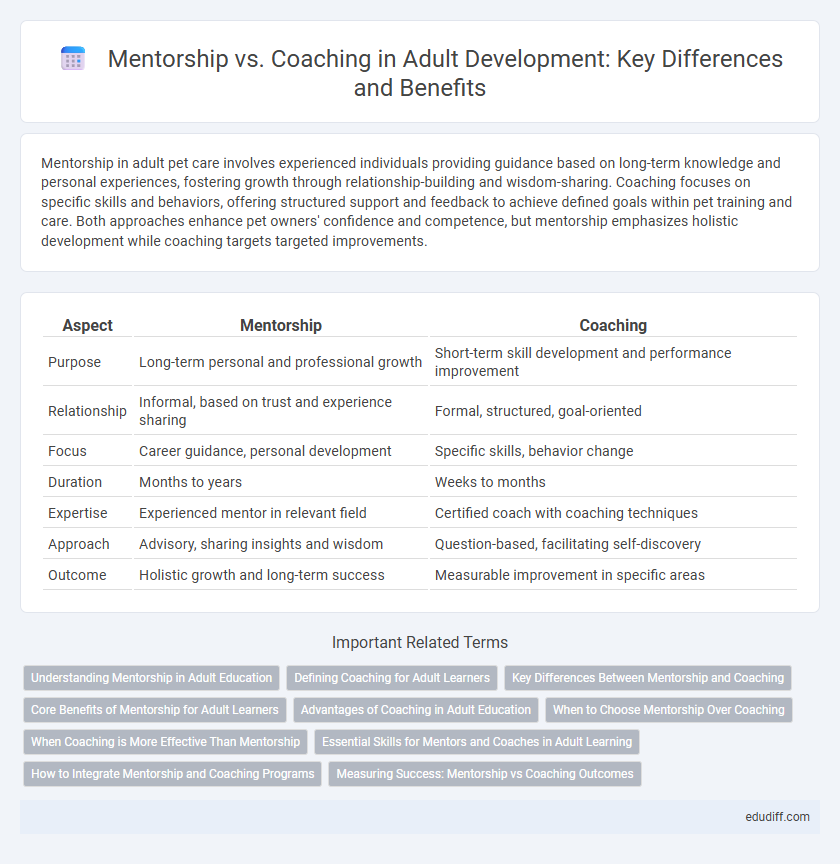Mentorship in adult pet care involves experienced individuals providing guidance based on long-term knowledge and personal experiences, fostering growth through relationship-building and wisdom-sharing. Coaching focuses on specific skills and behaviors, offering structured support and feedback to achieve defined goals within pet training and care. Both approaches enhance pet owners' confidence and competence, but mentorship emphasizes holistic development while coaching targets targeted improvements.
Table of Comparison
| Aspect | Mentorship | Coaching |
|---|---|---|
| Purpose | Long-term personal and professional growth | Short-term skill development and performance improvement |
| Relationship | Informal, based on trust and experience sharing | Formal, structured, goal-oriented |
| Focus | Career guidance, personal development | Specific skills, behavior change |
| Duration | Months to years | Weeks to months |
| Expertise | Experienced mentor in relevant field | Certified coach with coaching techniques |
| Approach | Advisory, sharing insights and wisdom | Question-based, facilitating self-discovery |
| Outcome | Holistic growth and long-term success | Measurable improvement in specific areas |
Understanding Mentorship in Adult Education
Understanding mentorship in adult education centers on fostering long-term, personalized relationships that support learners' professional and personal growth. Mentorship emphasizes guidance, experience-sharing, and development over time, helping adults navigate career paths and enhance skills through constructive feedback. This process cultivates trust and motivation, enabling mentees to achieve goals with the mentor's insight and support.
Defining Coaching for Adult Learners
Coaching for adult learners involves a personalized, goal-oriented approach that emphasizes skill development, self-reflection, and accountability. It fosters an empowering environment where learners actively participate in identifying challenges and exploring solutions to enhance their performance. This method prioritizes measurable progress and practical application over generalized advice or long-term guidance.
Key Differences Between Mentorship and Coaching
Mentorship involves a long-term relationship centered on personal and professional growth, often guided by the mentor's experience and wisdom. Coaching is typically short-term and performance-driven, focusing on specific skills, goals, and accountability through structured sessions. While mentorship emphasizes guidance and overall development, coaching prioritizes measurable outcomes and skill enhancement.
Core Benefits of Mentorship for Adult Learners
Mentorship for adult learners fosters long-term personal and professional growth through experienced guidance and tailored support. It enhances critical thinking, expands networks, and builds confidence by offering real-world insights and constructive feedback. This personalized relationship accelerates skill development and promotes adaptability in dynamic career landscapes.
Advantages of Coaching in Adult Education
Coaching in adult education offers personalized guidance tailored to individual learning styles and goals, enhancing skill acquisition and confidence. It promotes active engagement through goal-oriented feedback and continuous support, fostering self-awareness and motivation. The adaptive nature of coaching enables adults to overcome specific challenges efficiently, resulting in measurable progress and long-term development.
When to Choose Mentorship Over Coaching
Mentorship is ideal when seeking long-term professional growth through personalized guidance based on experience, whereas coaching targets specific skills or performance improvements within a defined timeframe. Choose mentorship when you need career navigation, industry insights, and ongoing support tailored to your personal development journey. Opt for coaching when immediate skill acquisition or behavioral change is the primary goal.
When Coaching is More Effective Than Mentorship
Coaching is more effective than mentorship when specific skill development or performance improvement is the primary goal, as it provides structured, goal-oriented guidance. Coaches offer targeted feedback and measurable outcomes, ideal for scenarios requiring rapid progress and accountability. In situations demanding short-term, focused interventions, coaching accelerates learning and enhances professional competencies more efficiently than mentorship.
Essential Skills for Mentors and Coaches in Adult Learning
Effective mentors in adult learning demonstrate active listening, empathy, and the ability to provide constructive feedback, fostering trust and personalized growth. Coaches prioritize goal-setting, motivational techniques, and performance evaluation to enhance skills and drive measurable outcomes. Both roles require strong communication, adaptability, and a deep understanding of adult learning principles to support learner autonomy and development.
How to Integrate Mentorship and Coaching Programs
Integrating mentorship and coaching programs enhances adult professional development by combining personalized guidance with skill-building strategies. Structured frameworks align mentorship's long-term career growth focus with coaching's targeted performance improvements, fostering holistic development. Leveraging digital platforms and regular feedback loops ensures seamless coordination, maximizing participant engagement and measurable outcomes.
Measuring Success: Mentorship vs Coaching Outcomes
Measuring success in mentorship hinges on long-term personal growth, career advancement, and the mentee's ability to apply insights independently, typically assessed through qualitative feedback and milestone achievements. Coaching outcomes emphasize measurable performance improvements, goal attainment, and behavioral changes, often tracked using KPIs, progress metrics, and structured evaluations. Both approaches require tailored assessment methods, with mentorship focusing on developmental depth and coaching prioritizing targeted results.
Mentorship vs Coaching Infographic

 edudiff.com
edudiff.com